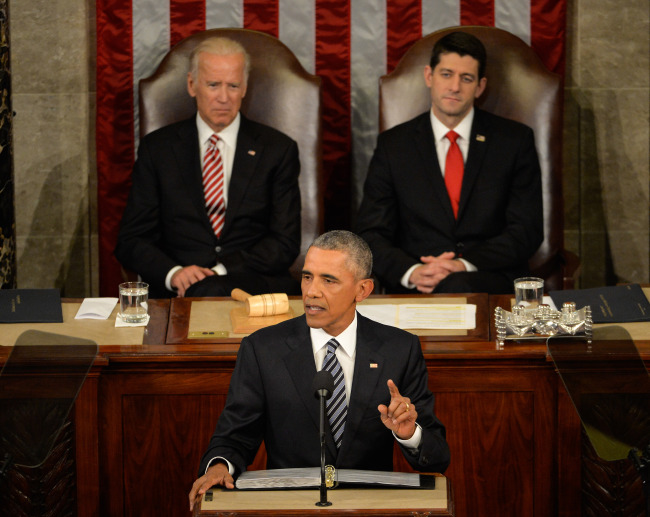U.S. President Barack Obama intentionally avoided mentioning North Korea in his final State of the Union address Wednesday, as he did not want to give attention to the communist state’s leader, according to a senior Washington official.
“If there is one thing I know about the leader of North Korea, it is that he likes attention and probably would like nothing more than the president to spend a lot of time to talk about it in the State of the Union,“ Ben Rhodes, a deputy national security adviser told reporters.
”We didn‘t particularly feel compelled to give him that attention.”
 |
| U.S. President Barack Obama delivers his State of the Union address to a joint session of Congress on Capitol Hill in Washington on Tuesday. (Yonhap-Xinhua) |
It was anticipated that Obama would touch on Pyongyang’s fourth nuclear test, given that his speech was delivered just a week after the surprise test and when the U.S. and its allies are pushing to adopt a U.N. Security Council resolution entailing tougher and “meaningful” sanctions.
Rhodes still called North Korea-related issues a “top priority” to the U.S. president. But he stressed that “strength should not be defined by provocations.”
“The way in which you show strength in the world should not be defined by the occasional provocative launch or test of a device while your own people are starving. We don’t seek to elevate him, personally. So, that was our thinking in that regard,” he said.
He also underscored the need for the U.S. to strengthen missile defense in close coordination with the South and Japan to better cope with the evolving nuclear and missile threats from the unpredictable regime.
Following Pyongyang’s latest nuclear test, the U.S. was expected to step up efforts to persuade Seoul to beef up missile defense by installing the Terminal High Altitude Area Defense system in the South.
President Park Geun-hye said during her New Year’s press conference that Seoul would review the possibility of the THAAD deployment here based strictly on national security interests. Her remarks were interpreted as her raising pressure on Beijing to exert more influence to stop the growth of Pyongyang’s nuclear program.
By Song Sang-ho (sshluck@heraldcorp.com)

